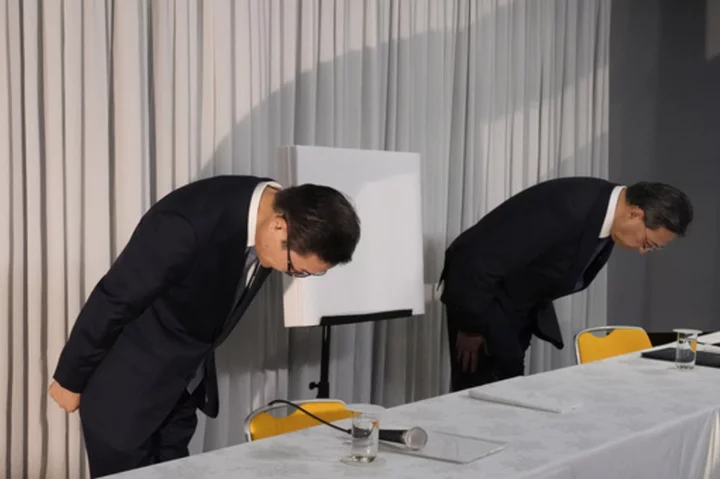TOKYO (AP) — The Unification Church’s Japanese branch announced plans Tuesday to set aside a fund up to 10 billion yen ($67 million) to cover possible compensation for those seeking damages they say were caused by the group’s manipulative fundraising tactics.
The move is seen as an attempt to allay any suspicion that the group would try to avoid later payouts by hiding assets overseas while a government-requested dissolution order is pending.
The announcement by head of the church's Japanese branch, Tomihiro Tanaka, came a month after Japan's Education Ministry asked the Tokyo District Court to revoke the legal status of the group.
The ministry investigation concluded that the South Korean-headquartered group for decades has systematically manipulated its followers into donating money, sowing fear and harming their family ties.
The investigation followed public outrage and questions about the group’s fundraising and recruitment tactics that surfaced after former Prime Minister Shinzo Abe’s assassination last year. The man accused of shooting Abe allegedly was motivated by the former prime minister’s links to the church and blamed it for bankrupting his family.
On Tuesday, Tanaka told reporters that the group is ready to deposit a fund of 6 billion yen ($40 million) to 10 billion yen ($67 billion) to the government if can set up a system to receive it. He offered what he said was a “sincere apology” over the sufferings and difficulty of former followers and their families, but denied his group did anything wrong.
He said the government request for a dissolution order is unacceptable “from the viewpoint of religious freedom and the rule of law.”
The government is asking the court to issue a dissolution order revoking the church’s status as a religious organization. The process involves closed hearings and appeals from both sides and could take months or possibly years.
If the church is stripped of its legal status, it could still operate but would lose its tax exemption privilege as a religious organization and would face financial setbacks. Some experts and lawyers supporting the victims have cautioned against an attempt by the church to hide its assets before a court decision, and lawmakers are now discussing measures to make sure the church assets stay in Japan to be used for compensation.
Tanaka denied that the group intended to transfer funds overseas, and said there was no need to take measures to preserve the group's assets.
A top church official in charge of reforms, Hideyuki Teshigawara, however, acknowledged that some church followers have traveled to South Korea to make donations there instead, but that details were not known.
Decades of cozy ties between the church and Japan’s governing Liberal Democratic Party were revealed since Abe’s assassination and have eroded support for Prime Minister Fumio Kishida’s government.
The governing party has pledged to cut ties with the group, but has conducted only cursory hearings on the extent of lawmakers' ties with the church, which opposition groups have criticized as insufficient.
The Unification Church obtained legal status as a religious organization in Japan in the 1960s during an anti-communist movement that was supported by Abe’s grandfather, then-Prime Minister Nobusuke Kishi.
The church has acknowledged collecting excessive donations in the past but says the problem was corrected in 2009 when it overhauled its governance. It also has pledged further reforms.
Experts say Japanese followers are asked to pay for sins committed by their ancestors during Japan’s 1910-1945 colonial rule of the Korean Peninsula, and that the majority of the church’s worldwide funding comes from Japan.
The only other organizations to have their religious status revoked in Japan are the Aum Shinrikyo doomsday cult, whose members carried out a sarin nerve gas attack on the Tokyo subway in 1995, and the Myokakuji group, whose executives were convicted of fraud.

